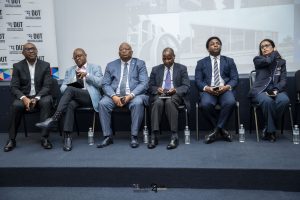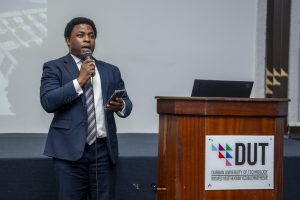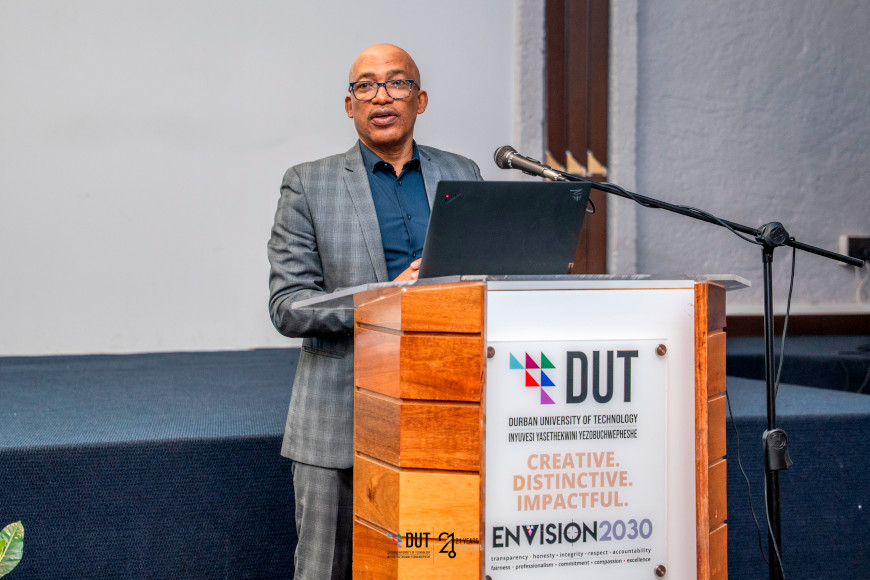Earlier this week, Professor Thandwa Mthembu, the Vice-Chancellor and Principal of the Durban University of Technology (DUT), hosted a series of Town Hall meetings over two days with Support Services staff based on the Durban campuses.
The eagerly anticipated engagements took place at the Mansfield Hall, Ritson campus in Durban on Monday, 21 July 2025 and Tuesday, 22 July 2025, where Professor Mthembu, along with members of the DUT Executive Management team, spoke on the history and the background of transformed academia, which is used as a blueprint for creating more impactful learning environments.
Senior Director of Corporate Affairs at DUT, Mr Alan Khan, was the Programme Director for all four sessions and he set the tone of the event, introducing the speakers and showcasing DUT’s visionary leader, Professor Mthembu and the topic of his presentation titled: Transformed Academia at DUT: Services to support and facilitate.
Professor Mthembu delivered his talk, highlighting and paraphrasing Peter Drucker’s words, indicating that leadership is doing the right things, while management is about doing the right things right and not doing the wrong things right. “If we go in accordance with what Drucker said and if one is doing the right things at DUT, then one is a leader, as that is what leadership is all about. If we want a perfect system, we should do the right thing but do the right things right,” he declared.
Speaking on stewardship from DUT’s ENVISION2030 strategy, Professor Mthembu elaborated that DUT needs to drive its values back into the university. “You will hardly find any university that encompasses the living values framework into their institution,” he said.
In Professor Mthembu’s quote given at the State of University Address in 2024, he shared that distinctive education is about creating a compelling and future-orientated environment for learning and living, which he indicated was on of the main reasons why such Town Hall sessions had taken place, which was to ensure that the environments are compelling and is sustainable going into the future. The Vice-Chancellor then spoke about the DUT strategic plan: 2014-2019, which was delivered in June 2017 and then, he focused on the launch of ENVISION2030.
“Education is through programmes, essentially what DUT sells is knowledge products and services to support and facilitate transformed academia. Students come for the educational programmes which is the core business and what students are essentially buying from us. We all are urged to work towards that,” he urged.
An example that Professor Mthembu presented was on the non-payment of part-time lecturers and related that the point was to conscientise their approach to ensure education is prioritised at DUT. He relayed that the administrative sub-systems could demonstrate more divergent thinking, innovation and transformation.
The Vice-Chancellor shared that there was a dire need for providing more academic time and reducing administrative tasks for academics. “One of the academics who met at the Faculty Town Hall meetings in May this year, estimated these administrative tasks to take 60% of their available time. While there is shared responsibility and accountability, academic versus administrative roles must not be blurred. To emphasise, responsibility lines between administration and academia must be re-demarcated,” said Professor Mthembu.
Delving further, Professor Mthembu asked pertinent questions pertaining to whether support services staff are serving in accordance with DUT’s living values framework (LVF), in particular, the values and principles? “Do we understand that academia is highly hierarchical, where salutations and addressing people have to be carefully considered? Who gives instructions to whom? Shared responsibility and accountability was meant to jettison silos in our system. Nobody must feel they are being sent from pillar to post; from RPS, to Finance, to HCS and other operational units, with no care for the outcomes of whatever queries or services being sought,” he indicated. He raised thought-provoking questions regarding how Different and now Upended are people in attitude, aptitude, practice and behaviour.
He touched on the online work approach which was emphasised during COVID-19, ushering in working online, and acknowledging that face-to-face services are still required. Professor Mthembu looked into the issues of budgets for faculties, departments and sub-units and whether the process of cascading budgets departmentally was transparent. He further spoke on the allocation of research funds, GOOT and project funds.
Professor Mthembu relayed further on the processes and timeframes taken on the procurement of and payments for special equipment required and on the issue of whether vendors or service providers are paid as agreed.
He stressed that there are processes in place with regards to all these issues which the interim Chief Financial Officer CFO) is dealing with currently, and possibly looking at designing a viable system to deal with single and sole suppliers expeditiously.
In terms of vacancies and appointments, Prof Mthembu proposed that posts (old or new) required for the start of an academic year be advertised and appointed to during the second semester of the previous year in preparation for the next year’s start of the academic year. He delved into developing a system to ensure whoever has been engaged/employed at DUT is paid on time.
“Being the leaders and managers that you are that you will all share those innovations and strategies with colleagues to make DUT compelling as this is what we are all about. DUT must focus on the knowledge transfer so that we may continue for many generations to come so that future generations can come to a legacy that has been kept alive by this institution,” he said.
 Following Professor Mthembu’s presentation, members of the executive management team formed part of a question and answer session where attendees were given the opportunity to pose questions and some highlighted issues raised were around Human Capital Services (HCS) matters such as short term contract positions, restructuring processes and post-retirement issues, focusing on the policies and procedures as well as the reviewing processes pertaining to such issues which are not aligning to ENVISION2030.
Following Professor Mthembu’s presentation, members of the executive management team formed part of a question and answer session where attendees were given the opportunity to pose questions and some highlighted issues raised were around Human Capital Services (HCS) matters such as short term contract positions, restructuring processes and post-retirement issues, focusing on the policies and procedures as well as the reviewing processes pertaining to such issues which are not aligning to ENVISION2030.
Senior Director of Institutional Planning, Dr Kavita Beemsen outlined some of her thoughts to the conversation pertaining to Professor Mthembu’s talk from SOUA 2024, on the concept of self-agency and self-bureaucracy.
“These are all part of the DUT vocabulary. The first thing I would request of you is to engage in some self-agency and self-bureaucracy. Go back, reflect on our creativity’s strategic objectives. Think about what those words mean, the definition or the explanation of what creativity is. One of the calls is about critical self-reflection, think about that within your roles. How would you then become your own bureaucrat in the short term to adjust and to change so that we can we can start fixing some of the problems we just heard about,” she said.
Dr Beemsen further indicated that everyone should do self-reflection and ready themselves for shared responsibility and accountability. “We need you to come up from the ground up and to come up with those creative, innovative ideas and that self-agency in us that is going to position us to become that partner that transformed academia is requesting of support services,’ she said.
Addressing staff during Town Sessions three and four, Dr Matheakuena Mohale, Director: Special Projects in the Vice-Chancellery at DUT, highlighted that all parties needed to work together to find some level of consensus that has been mentored in the upended phase at DUT.
 Providing concluding remarks on day one was the DUT Deputy Vice-Chancellor: Research, Innovation and Engagement, Professor Fulufhelo Nemavhola and on day two, Ms Lungile Sikhakhane, Director: Management Accounting and Reporting. Professor Nemavhola, on behalf of the executives and senior management at DUT, expressed his vote of thanks to all staff for their active participation in the Town Hall engagements.
Providing concluding remarks on day one was the DUT Deputy Vice-Chancellor: Research, Innovation and Engagement, Professor Fulufhelo Nemavhola and on day two, Ms Lungile Sikhakhane, Director: Management Accounting and Reporting. Professor Nemavhola, on behalf of the executives and senior management at DUT, expressed his vote of thanks to all staff for their active participation in the Town Hall engagements.
“I would like to thank the Vice-Chancellor for taking his time to come and engage and present to us. Lastly, I would like to thank Mr Khan, the Programme Director and the organisers who had worked tirelessly behind the scenes to ensure the event proceeds smoothly,” said Professor Nemavhola.
Ms Lungile Sikhakhane expressed that everyone had the opportunity to make what was wrong, right and she thanked all staff for being in attendance.
Next week, Professor Mthembu and the DUT Executive Management team will host similar Town Hall Meetings with the support services staff based in Pietermaritzburg.
Pictured: Vice-Chancellor and Principal of DUT, Professor Thandwa Mthembu speaking at the Town Hall Meeting in Durban.
Simangele Zuma/Waheeda Peters

